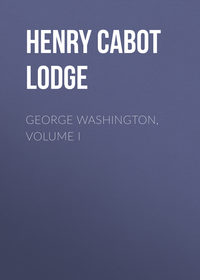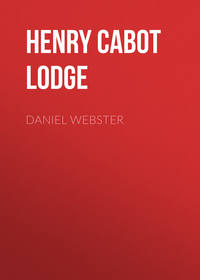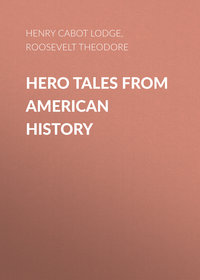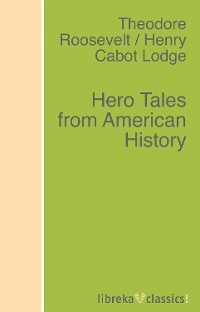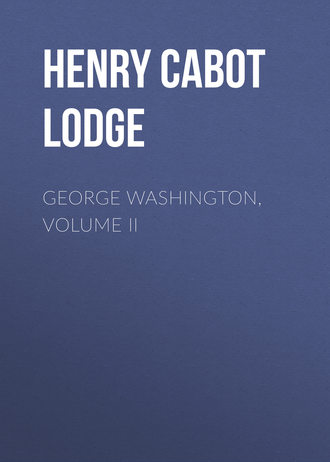 полная версия
полная версияGeorge Washington, Volume II
CHAPTER V
WASHINGTON AS A PARTY MAN
Washington was not chosen to office by a political party; he considered parties to be perilous things, and he entered the presidency determined to have nothing to do with them. Yet, as has already been pointed out, he took the members of his cabinet entirely from one of the two parties which then existed, and which had been produced by the divisions over the Constitution and its adoption. To this charge he would no doubt have replied that the parties caused by the constitutional differences had ceased to exist when that instrument went into operation, and that it was to be supposed that all men were then united in support of the government. Accepting this view of it, it only remains to see how he fared when new and purely political parties, as was inevitable, sprang into active life.
Whatever his own opinions may have been as to parties and party-strife, Washington was under no delusions in regard either to human nature or to himself, and he had no expectation that everything he said or did would meet with universal approbation. He well knew that there would be dissatisfaction, and no man ever took high office with a mind more ready to bear criticism and to profit by it. Three months after his inauguration he wrote to his friend David Stuart: "I should like to be informed of the public opinion of both men and measures, and of none more than myself; not so much of what may be thought commendable parts, if any, of my conduct, as of those which are conceived to be of a different complexion. The man who means to commit no wrong will never be guilty of enormities; consequently he can never be unwilling to learn what are ascribed to him as foibles. If they are really such, the knowledge of them in a well-disposed mind will go half-way towards a reform. If they are not errors, he can explain and justify the motives of his actions." This readiness to hear criticism and this watching of public opinion were characteristic, for his one desire was to know the truth and never deceive himself. His journey through New England in the autumn of that year, his visit to Rhode Island a year later, and his trip through the southern States in the spring of 1791, had a double motive. He wished to bring home to the people the existence and the character of the new government by his appearance among them as its representative; and he desired also to learn from his own observation, and from inquiries made on the spot, what the people thought of the administration and its policies, and of the doings of Congress. He was a keen observer and a good gatherer of information; for he was patient and persistent, and had that best of all gifts for getting at public opinion, an absolute and cheerful readiness to listen to advice from any one. His travels all had the same result. In the South as in New England he found that the people were pleased with the new government, and contented with the prosperity which began at once to flow from the adoption of a stable national system.
More credit, if anything, was given to it than it really deserved; for, as he had written to Lafayette before the Constitution went into effect, "Many blessings will be attributed to our new government which are now taking their rise from that industry and frugality into which the people have been forced from necessity." Whether this were true or not, the new government was entitled to the benefit of all accidents, and Washington's correct conclusion was that the great body of the people were heartily with him and his administration. But he was also quite aware that all the criticism was not friendly, and as the measures of the government one by one passed Congress, he saw divisions of sentiment appear, slight at first, but deepening and hardening with each successive contest. Indeed, he had not been in office a year when he wrote a long letter to Stuart deploring the sectionalism which had begun to show itself. The South was complaining that everything was done in the interest of the northern and eastern States, and against this idea Washington argued with great force. He was especially severe on the unreasonable and childish character of such grievances, and he attributed the feeling in certain States largely to the outcries of persons who had come home disappointed in some personal matter from the seat of government. "It is to be lamented," he said, "that the editors of the different gazettes in the Union do not more generally and more correctly (instead of stuffing their papers with scurrility and nonsensical declamation, which few would read if they were apprised of the contents) publish the debates in Congress on all great national questions. And this, with no uncommon pains, every one of them might do." Washington evidently believed that there was no serious danger of the people going wrong if they were only fully informed. But the able editors of that day no doubt felt that they and their correspondents were better fitted to enlighten the public than any one else could be, and there is no evidence that any of them ever followed the President's suggestion.
The jealousies and the divisions in Congress, which Washington watched with hearty dislike on account of their sectional character, began, as is well known, with the financial measures of the Treasury. As time went on they became steadily more marked and better defined, and at last they spread to the cabinet. Jefferson had returned to take his place as Secretary of State after an absence of many years, and during that time he had necessarily dropped out of the course of home politics. He came back with a very moderate liking for the Constitution, and an intention undoubtedly to do his best as a member of the cabinet. His first and most natural impulse, of course, was to fall in with the administration of which he was a part; and so completely did he do this that it was at his table that the famous bargain was made which assumed the state debts and took the capital to the banks of the Potomac.
Exactly what led to the first breach between Jefferson and Hamilton, whose financial policy was then in the full tide of success, is not now very easy to determine. Jefferson's action was probably due to a mixture of motives and a variety of causes, as is generally the case with men, even when they are founders of the democratic party. In the first place, Jefferson very soon discovered that Hamilton was looked upon as the leader in the cabinet and in the policies of the administration, and this fact excited a very natural jealousy on his part, because he was the official head of the President's advisers. In the second place, it was inevitable that Jefferson should dislike Hamilton, for there never were two men more unlike in character and in their ways of looking at things. Hamilton was bold, direct, imperious, and masculine; he went straight to his mark, and if he encountered opposition he either rode over it or broke it down. When Jefferson met with opposition he went round it or undermined it; he was adroit, flexible, and extremely averse to open fighting. There was also good ground for a genuine difference of opinion between the two secretaries in regard to the policy of the government. Jefferson was a thorough representative of the great democratic movement of the time. At bottom his democracy was of the sensible, practical American type, but he had come home badly bitten by many of the wild notions which at that moment pervaded Paris. A man of much less insight than Jefferson would have had no difficulty in perceiving that Hamilton and his friends were not in sympathy with these ideas. They hoped for the establishment of a republic, but they desired for it a highly energetic and centralized government not devoid of aristocratic tendencies. This fundamental difference of opinion, increased as it was by personal jealousies, soon put Jefferson, therefore, into an attitude of hostility to the men who were then guiding the policy of the government. The new administration had been so successful that there was at first practically no party of opposition, and the task before Jefferson involved the creation of a party, the formulation of principles, and the definition of issues, with appropriate shibboleths for popular consumption. Jefferson knew that Hamilton and all who fought with him were as sincerely in favor of a republic as he himself was; but his unerring genius in political management told him that he could never raise a party or make a party-cry out of the statement that, while he favored a democratic republic, the men to whom he was opposed preferred one of a more aristocratic caste. It was necessary to have something much more highly seasoned than this. So he took the ground that his opponents were monarchists, bent on establishing a monarchy in this country, and were backed by a "corrupt squadron" in Congress in the pay of the Treasury. This was of course utter nonsense, but it served its purpose admirably. Jefferson, indeed, shouted these cries so much that he almost came to believe in them himself, and sympathetic writers to this day repeat them as if they had reality instead of having been mere noise to frighten the unwary. The prime object of it all was to make the great leaders odious by connecting them in the popular mind with the royal government that had been overthrown.
Jefferson's first move was a covert one. In the spring of 1791 he received Thomas Paine's "Rights of Man," and straightway sent the pamphlet to the printer with a note of approbation reflecting upon John Adams. The pamphlet promptly appeared in a reprint with the note prefixed. It made much stir, and the published approval of the Secretary of State excited a great deal of criticism, much of which was very hostile. Jefferson thereupon expressed extreme surprise that his note had been printed, and on the plea of explaining the matter wrote to Washington a letter, in which he declared that his friend Mr. Adams, for whom he had a most cordial esteem, was an apostate to hereditary monarchy and nobility. He further described his old friend as a political heretic and as the bellwether Davila, upon whom and whose writings Mr. Adams had recently been publishing some discourses. It is but fair to say that no more ingenious attack on the Vice-President could have been made, but the purpose of it was simply to arrest the public attention for the real struggle which was to follow.
The true object of all these movements was to rally a party and break down Jefferson's great colleague in the cabinet. The "Rights of Man" served to start the discussion; and the next step was to bring on from New York Philip Freneau, a verse-writer and journalist, and make him translating clerk in the State Department, and editor of an opposition newspaper known as the "National Gazette." The new journal proceeded to do its work after the fashion of the time. It teemed with abuse not only of Hamilton and Adams and all the supporters of the treasury measures, denouncing them as "monarchists," "aristocrats," and "a corrupt squadron," but it even began a series of coarse assaults upon the President himself. Jefferson, of course, denied that he had anything to do with the writing in the newspaper, and Freneau made oath at the time that the Secretary wrote nothing; but in his old age he declared that Jefferson wrote or dictated all the most abusive articles, and he showed a file of the "Gazette" with these articles marked. Strict veracity was not the strongest characteristic of either Freneau or Jefferson, and it is really of but little consequence whether Freneau was lying in his old age or in the prime of life. The undoubted facts of the case are enough to fix the responsibility upon Jefferson, where it belongs. The editor of a newspaper devoted to abusing the administration was brought to Philadelphia by the Secretary of State, was given a place in his department, and was his confidential friend. Jefferson himself took advantage of his position to gather material for attacks upon his chief, and upon his colleagues, to whom he was bound to be loyal by every rule which dictates the conduct of honorable men. He did not, moreover, content himself with this outside work. It has been too much overlooked that Jefferson, in addition to forming a party and organizing attacks upon the Secretary of the Treasury and his friends, sought in the first instance to break down Hamilton in the cabinet, to deprive him of the confidence of Washington, and by driving him from the administration to get control himself. At no time did Jefferson ever understand Washington, but he knew him well enough to be quite aware that he would never give up a friend like Hamilton on account of any newspaper attacks. He therefore took a more insidious method.
Knowing that Washington was in the habit of consulting with old friends at home of all shades of opinion in regard to public affairs, he contrived through their agency to have his own charges against Hamilton laid before the President. He also, to make perfectly sure, wrote himself to Washington, candidly setting forth outside criticism, and his letter took the form of a well-arranged indictment of the Treasury measures. This method had the advantage of assailing Hamilton without incurring any responsibility, and the charges were skilfully formulated and ingeniously constructed to raise in the mind of the reader every possible suspicion. At this point Washington comes for the first time into the famous controversy from which our two great political parties were born. He did exactly what Jefferson would not have done, sent the charges all duly formulated to Hamilton, and asked him his opinion about them. As the accusations thus made against the policies of the government and the Secretary of the Treasury were all mere wind of the "monarchist" and "corrupt squadron" order, Hamilton disposed of them with very little difficulty. The whole proceeding, if Jefferson was aware of it at the time, must have been a great disappointment to him. But his mistake was the natural error of an ingenious man wasting his efforts on one of great directness and perfect simplicity of character. Hamilton's answer was what Washington undoubtedly expected. He knew the hollowness of the attack, but none the less he was made anxious by it as an indication of the serious party divisions rising about him. This, however, was but the beginning, and he was soon to have much more direct evidence of the grave nature of a political conflict, which he then could not bring himself to believe was irrepressible.
Hamilton, on his side, was not the most patient of men, and although he bore the attacks of Frenean for some time in silence he finally retaliated. He did not get any one to do his fighting for him, but under a thin disguise proceeded to answer in Fenno's newspaper the abuse of the "National Gazette." He was the best political writer in the country, and when he struck, his blows told. Jefferson winced and cried out under the punishment, but it would have been more dignified in Hamilton to have kept out of the newspapers. Still there was the fight. It had gone from the cabinet to the press, and the public knew that the two principal secretaries were at swords' points and were marshaling behind them strong political forces. The point had been reached where the President was compelled to interfere unless he wished his administration to be thoroughly discredited by the bitter and open conflicts of its members.
He wrote to both secretaries in a grave and almost pathetic tone of remonstrance, urging them to abandon their quarrel, and, sinking minor differences, to work with him for the success of the Constitution to which they were both devoted. Each man replied after his fashion. Hamilton's letter was short and straight-forward. He could not profess to have changed his opinion as to the conduct or purpose of his colleague, but he regretted the strife which had arisen, and promised to do all that was in his power to allay it by ceasing from further attacks. Jefferson wrote at great length, controverting Hamilton's published letters in a way which showed that he was still smarting from the well-aimed shafts. He also contrived to make his own defense the vehicle for a renewal of all his accusations against the Treasury, and he wound up by saying that he looked forward to retirement with the longing of "a wave-worn mariner," and that he should reserve any further fighting that he had to do until he was out of office. Soon after he followed this letter with another, containing a collection of extracts from his own correspondence while in Paris, to show his devotion to the Constitution. One is irresistibly reminded by all this of the Player Queen—"The lady protests too much, methinks." Washington had not accused Jefferson of lack of loyalty to the Constitution, indeed he had made no accusations against him of any kind; but Jefferson knew that his own position was a false one, and he could not refrain from taking a defensive tone. Washington, in his reply, said that he needed no proofs of Jefferson's fidelity to the Constitution, and reiterated his earnest desire for an accommodation of all differences. "I will frankly and solemnly declare," he said, "that I believe the views of both of you to be pure and well-meant, and that experience only will decide with respect to the salutariness of the measures which are the subjects of dispute.... I could, and indeed was about to, add more on this interesting subject, but will forbear, at least for the present, after expressing a wish that the cup which has been presented to us may not be snatched from our lips by a discordance of action, when I am persuaded there is no discordance in your views."
The difficulty was that there was not only discordance in the views of the two secretaries, but a fundamental political difference, extending throughout the people, which they typified. The accommodation of views and the support of the Constitution could only mean a support of Washington's administration and its measures. Those measures not only had the President's approval, but they were in many respects peculiarly his own, and in them he rightly saw the success and maintenance of the Constitution. But, unfortunately for the interests of harmony, these measures were either devised or ardently sustained by the Secretary of the Treasury. They were not the measures of the Secretary of State, and received from him either lukewarm support or active, if furtive, hostility. The only peace possible was in Jefferson's giving in his entire adherence to the policies of Washington and Hamilton, which were radically opposed to his own. In one word, a real, profound, and inevitable party division had come, and it had found the opposing chiefs side by side in the cabinet.
Against this conclusion Washington struggled hard. He had come in as the representative and by the votes of the whole people, and he shrank from any step which would seem to make him lean on a party for support in his administration. He had made up his cabinet with what he very justly considered the strongest material. He believed that a breaking up of the cabinet or a change in its membership would be an injury to the cause of good government, and he was so entirely single-minded in his own views and wishes, that, with all his knowledge of human nature, he found it difficult to understand how any one could differ from him materially. Moreover, having started with the firm intention of governing without party, he determined, with his usual persistence, to carry it through, if it were possible. When party feeling had once developed, and division had sprung up between the two principal officers of his cabinet, no greater risk could have been run than that which Washington took in refusing to make the changes which were necessary to render the administration harmonious. With any lesser man, such a perilous experiment would have failed and brought with it disastrous consequences. There is no greater proof of the force of his will and the weight and strength of his character than the fact that he held in his cabinet Jefferson and Hamilton, despite their hatred for each other and each other's principles, and that he not only prevented any harm, but actually drew great results from the talents of each of them. Yet, with all his strength of grasp, this ill-assorted combination could not last, although Washington resisted the inevitable in a surprising way, and he even begged Jefferson to remain when the impossibility of doing so had become quite clear to that gentleman.
The remonstrance in regard to the Freneau matter had but a temporary effect. Hamilton stopped his attacks, it is true; but Jefferson did not discontinue his, and he set on foot a movement which was designed to destroy his rival's public and private reputation. Hamilton met this attack in Congress, where he refuted it signally; and although the ostensible movers were members of the House, the defeat recoiled on the Secretary of State. Having failed in Congress and before the public to ruin his opponent, and having failed equally to shake Washington's confidence in Hamilton or the latter's influence in the administration, Jefferson made up his mind that the cabinet was no longer the place for him. He became more than ever satisfied that he was a "wave-worn mariner," and after some hesitation he finally resigned and transferred his political operations to another field. A year later Hamilton, from very different reasons of a purely private character, followed him.
Meantime many events had occurred which all tended to show the growing intensity of party divisions, and which were not without their effect upon the mind of the President. In 1792 it became necessary to consider the question of the approaching election, and all elements united in urging upon Washington the absolute necessity of accepting the presidency a second time. Hamilton and the Federalists, of course, desired Washington's reëlection, because they regarded him as their leader, as the friend and supporter of their measures, and as the great bulwark of the government. Jefferson, who was equally urgent, felt that in the unformed condition of his own party the withdrawal of Washington, in addition to its injury to the general welfare, would leave his incoherent forces at the mercy of an avowed and thorough-going Federalist administration.
So it came about that Washington received another unanimous election. He had no great longing for public office, but at this time he seems to have been not without a desire to continue President, in order that he might carry his measures to completion. In the unanimity of the choice he took a perfectly natural pleasure, for besides the personal satisfaction, he could not but feel that it greatly strengthened his hands in doing the work which he had at heart. On January 20, 1793, he wrote to Henry Lee: "A mind must be insensible, indeed, not to be gratefully impressed by so distinguished and honorable a testimony of public approbation and confidence; and as I suffered my name to be contemplated on this occasion, it is more than probable that I should, for a moment, have experienced chagrin if my reëlection had not been by a pretty respectable vote. But to say I feel pleasure from the prospect of commencing another tour of duty would be a departure from the truth." Some time was still to pass before Washington, either by word or deed, would acknowledge himself to be the chief or even a member of a party; but before he entered the presidency a second time, he had no manner of doubt that a party existed which was opposed to him and to all his measures.
The establishment of the government and the treasury measures had very quickly rallied a strong party, which kept the name that it had adopted while fighting the battles of the Constitution. They were known in their own day, and have been known ever since to history, as the Federalists. The opposition, composed chiefly of those who had resisted the adoption of the Constitution, were discredited at the very start by the success of the union and the new government. When Jefferson took hold of them they were disorganized and even nameless, having no better appellation than that of "Anti-Federalists." In the process of time their great chief gave them a name, a set of principles, a war-cry, an organization, and at last an overwhelming victory. They began to take on something like form and coherence in resisting Hamilton's financial measures; but the success of his policy was so dazzling that they were rather cowed by it, and were left by their defeat little better off in the way of discipline than before. The French Revolution and its consequences, including a war with England, gave them a much better opportunity. It is melancholy to think that American parties should have entered upon their first struggle purely on questions of foreign politics. The only explanation is to repeat that we were still colonists in all but name and allegiance, and it was Washington's task not only to establish a dignified and independent policy of his own abroad, but to beat down colonial politics at home.


